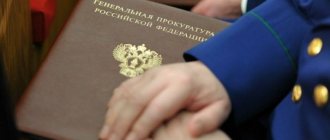The concept of justice and its signs
The main, main content of the judiciary is the administration of justice. The Constitution of the Russian Federation speaks about justice repeatedly and in connection with different legal situations:
- Part 5 of Article 32 of the Russian Constitution establishes the right of citizens to “participate in the administration of justice”;
- Part 2 of Article 50 prohibits “the use of evidence obtained in violation of federal law” in the administration of justice;
- Article 52 is dedicated to the protection of the rights of victims from crimes and abuses of power and states: “The state ensures that victims have access to justice and compensation for damage caused”;
- Part 1 of Article 118 of the Constitution contains the most important legal provision for the judiciary: “Justice in the Russian Federation is carried out only by the court.”
Russian language experts S.I. Ozhegov and N.Yu. Shvedova define “justice as the activities of the judiciary; fair resolution of a case or dispute.”
The concept of justice is, first of all, a legal concept. Therefore, its definition and main elements must be based on relevant legal norms and institutions.
Justice , one of the areas of state activity called law enforcement, is one of the most important powers of the judiciary. It occupies a central place both in the system of law enforcement and in the powers of the judiciary. The administration of justice is manifested in decision-making on fundamental issues of the implementation of socio-economic, political and personal rights and freedoms of man and citizen, the rights and legitimate interests of state and public institutions.
Justice is administered only by the court (judge) and, therefore, represents a type of state activity in which judicial power is exercised. The administration of justice is the exclusive competence of the court. Only justice has the final say when declaring a particular person guilty and assigning him a punishment.
Justice is characterized by a special procedural order; this type of state activity can only be carried out in specific ways, in compliance with a special order (procedure), regulated in detail by law, establishing the procedure for the court to consider and resolve specific cases, decisions on which only the court has the right to make. This procedure ensures the rights and legally protected interests of those who are affected by the activities of the court and who participate in this court case. Justice is law enforcement activity based on strict compliance with laws. Judges administering justice are independent; they are subject to the Constitution of the Russian Federation and laws. Justice in its true sense occurs when the court has correctly identified all the relevant circumstances for a given case and accurately applied the law, making a fair decision on this basis. If the court makes a decision that is contrary to the law (for example, it condemns an innocent person for a crime), then this is not justice, but lawlessness, arbitrariness.
Justice, from a legal and moral point of view, is justice based on the law. The trial and resolution of cases in court is a way of administering justice.
In accordance with Art. 4 of the Federal Law “On courts of general jurisdiction in the Russian Federation” courts of general jurisdiction consider:
- all civil and administrative cases on the protection of violated or disputed rights, freedoms and interests protected by law, with the exception of cases that, in accordance with the legislation of the Russian Federation, are considered by other courts;
- all criminal cases;
- other cases assigned to their jurisdiction by the Constitution of the Russian Federation, federal constitutional laws and federal laws.
This article most correctly defines the methods (paths) of administering justice in civil and criminal cases at the present time.
Justice is carried out by considering specific cases in court sessions and making appropriate decisions by the court. The court conducts the hearing under the guidance of a professional judge. It involves those citizens and organizations who are interested in the outcome of the case - the parties enjoying equal procedural rights. At the court hearing, evidence is examined in order to establish the true circumstances of the case. The court hearing ends with a decision in a civil case or a verdict in a criminal case. These court decisions are usually called acts of justice. Acts of justice - decisions on specific cases adopted by courts within their competence have generally binding force. They (according to the terminology of procedural legislation) come into force after the expiration of the period for appeal (10 days) or after confirmation of correctness by a higher court.
A decision in a civil case and a sentence in a criminal case, from the point of view of their binding nature, are equal to the law.
The execution of sentences in criminal cases and decisions in civil cases is ensured, in particular, by the possibility of using state coercive measures. Acts of justice, in accordance with the law, are endowed with special properties, one of them is that they are generally binding on everyone and throughout the entire territory of Russia; failure to execute them or obstruction of their execution may entail the application of various types of sanctions against those who are guilty of this, up to imprisonment.
The traditional concept of justice, based on the norms of legislation on the judicial system, included only the activities of courts to consider and resolve civil and criminal cases. However, at present, due to the increasing role of the judiciary in regulating public relations, the question arises about the essence of the activities of courts considering cases of administrative offenses.
In accordance with Art. 23.1 of the Code of Administrative Offenses, cases of certain offenses of this type are subject to consideration by courts (judges). In the specialized literature, very opposing views are expressed regarding the nature of the activities of the court considering cases of administrative offenses.
It should be noted that the range of cases of administrative offenses under the jurisdiction of judges is very narrow, and the procedure for their consideration by a judge is simplified. Therefore, the issue of administrative justice required an appropriate legislative solution. In this case, it is necessary to take into account the provisions of Art. 118 of the Constitution of the Russian Federation, which talks about administrative proceedings. In this regard, on September 15, 2015, the Code of Administrative Procedure came into force.
In accordance with Art. 4 FKZ “On Arbitration Courts in the Russian Federation” and Art. 1 of the Arbitration Procedural Code of the Russian Federation, arbitration courts administer justice by resolving economic disputes and considering other cases within their competence by relevant laws. Arbitration courts are judicial bodies that are part of the judicial system of the Russian Federation, they are guided by the Arbitration Procedural Code of the Russian Federation, apply substantive law, guided by the principle of legality, consider arbitration cases with the participation of the parties in court hearings; judicial acts of these courts have generally binding force. Thus, the activity of arbitration courts represents the administration of justice and has all its characteristics.
Taking into account these distinctive features, justice can be defined as law enforcement activities carried out by the court to consider and resolve civil, criminal, arbitration and administrative cases subordinate to the courts, while strictly observing the requirements of the law and the order established by it, ensuring the legality, validity, fairness and generally binding nature of court decisions.
In connection with the provisions of Art. 118 part 2 of the Constitution of the Russian Federation, which talks about the exercise of judicial power “through constitutional, civil, administrative and criminal proceedings,” the question arises about the existence of such a type of justice as constitutional justice. The use of this concept seems legitimate, but taking into account the fact that the competence of the Constitutional Court of the Russian Federation and its acts in their content differ significantly from the law enforcement acts of all other courts.
Legal proceedings and justice are close concepts, but do not coincide, because the former can end without the implementation of justice.
The qualitative difference between the content of the activities of the Constitutional Court of the Russian Federation and the activities of other courts administering justice is that the latter apply laws to specific situations based on their constitutionality, and the Constitutional Court of the Russian Federation controls the compliance of normative acts with the Constitution of Russia or verifies the constitutionality of the law applied or subject to application in proceedings in a specific case – Art. 125 of the Constitution of the Russian Federation. The Constitutional Court of the Russian Federation cannot be considered a higher court or be attributed to any level of the judicial system. But its powers extend to the sphere of activity of all courts.
Types of justice activities
Having considered the concept of justice, we need to study its types of activities in more detail. Justice includes the following activities:
- consideration and resolution of civil cases;
- consideration of criminal cases and the application of penalties established at the legislative level to persons guilty of committing criminal acts or the acquittal of innocent people.
In addition to courts of general jurisdiction, arbitration and constitutional courts operate in Russia. Their activities are also related to the implementation of legal processes. Arbitration judicial bodies deal with the consideration and resolution of economic disputes and other issues within their competence. The activities of the Constitutional Court are not covered by the concept of justice.
In addition to all of the above, justice should include the consideration of administrative cases. In addition, according to the current legislation, the activities of magistrates are also justice.
System of principles of legal proceedings and criminal procedure
The main signs of justice
In accordance with Article 118 of the Constitution of the Russian Federation, justice can be administered exclusively by the judiciary. The administration of justice is carried out strictly in accordance with certain procedural rules established at the legislative level. They are spelled out in documents such as the Code of Criminal Procedure, the Arbitration Procedure Code and the Code of Civil Procedure of the Russian Federation.
The justice process is carried out in compliance with certain principles. They are called constitutional or legal.
In essence, the principles of justice are ideological ideas characterized by a high degree of generality. They determine what should be and what is in the construction and work of justice bodies. The main features of justice are:
- I sign. Principles are ideological ideas that, on the one hand, are objective in nature, dictated by the laws of development of society and nature, and on the other hand, society influences their understanding, formulation and interpretation;
- II sign. Principles are ideas regarding what is and what should be. The principle of functioning of justice should be based on an ideal version of structure or action. Both legislators and practicing judges must adhere to this order;
- III sign. The principles are intended to characterize the organization and activities of the judiciary. The principle contains an ideal and real scheme of the process of execution of judicial power;
- IV sign. The principles of justice must be enshrined and manifested in law. The principle can be materialized in the form of concrete activities of justice through law. The form of manifestation and enshrinement in law can be different. The law can only name a principle or reveal its content.
The principles of justice are enshrined in various legislative acts of the Russian Federation, including the Constitution. The principles are not enshrined in the by-laws, since the above documents are not endowed with sufficient legal force.






